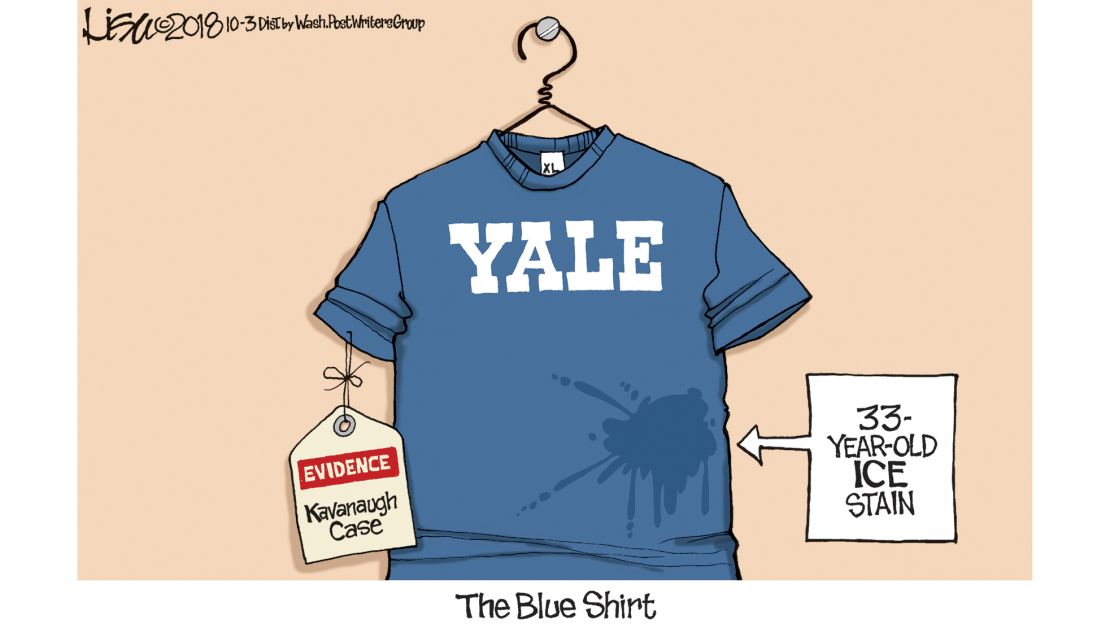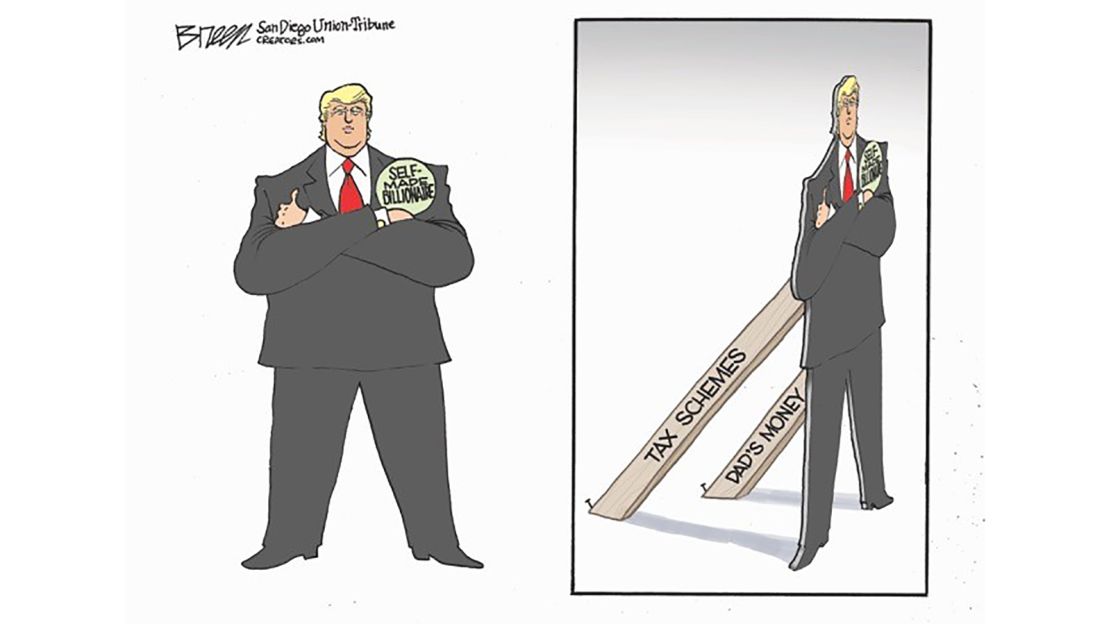Editor’s Note: In a new series of weekly columns (available soon as a newsletter), we’re looking back at the strongest, smartest opinion takes of the week from CNN and other outlets.
After weeks of excruciating buildup, the end to the Brett Kavanaugh saga came fast and furious.
Fast on the part of the Republicans who would not let Kavanaugh’s confirmation to the Supreme Court be derailed by accusations of sexual assault and lying that they dismissed. Furious on the part of everybody, it seemed – those who considered the nominee manifestly unsuitable both for his views and the allegations about his behavior, and those who argued that a good, innocent man had been smeared.
Across the nation, the days leading up to the confirmation vote were a total immersion in issues of gender, power and politics. Coming exactly a year after the Harvey Weinstein scandal ignited the #MeToo movement, the debate over the nominee and the roles of women and men showed no sign of stopping.
Writing for CNN Opinion, actress and activist Alyssa Milano saw a straight line between the abuse allegations leveled at both Kavanaugh and Trump and charges of sexual violence, abuse and neglect of migrant children “separated from their families by the Trump regime’s cruel and unnecessary family separation policy.” She wrote: “Can we doubt that, if we confirm Brett Kavanaugh to the Supreme Court, this further institutionalization of sexual violence will not rear its ugly head in myriad unseen ways throughout our nation?”
And Caroline Criado Perez drew a parallel between the pro-Kavanaugh GOP and the international soccer hierarchy, which closed ranks after a teacher accused star footballer Cristiano Ronaldo of raping her. “Let’s be honest about this. For a brief moment, institutions may make sad faces about tough decisions” and sexual assault. “But then institutional muscle memory will take over, and they will revert to type.”

A “charade,” wrote Frida Ghitis of the additional FBI background probe into allegations that Kavanaugh sexually abused women in both prep school and at Yale, “meant to give the GOP a way to confirm Kavanaugh without paying a political price.” They’ll pay anyway in the midterm elections, she wrote. (History, and Trump blowback, says it will probably be a very bad election for Republicans, wrote Trump adviser Jack Kingston.)
Kavanaugh himself wrote an op-ed in The Wall Street Journal. He admitted saying some bad things at his hearing, but denied “wrongful and sometimes vicious allegations” against him and insisted he would be an independent justice and “a team player.”
(Three of his Yale drinking buddies parried, in a Washington Post op-ed, saying that he lied under oath and “should not sit on the nation’s highest court.”)
President Donald Trump got involved, and on Tuesday, in front of a cheering crowd, he made fun of Christine Blasey Ford (“Wonder why victims of sexual assault don’t come forward?” asked Tara Setmayer) and called it “a scary time for men.”
Scott Jennings wrote that Susan Collins’ speech Friday announcing she’d vote for Kavanaugh was a brave rebuke to Democrats who had reflexively rejected Kavanaugh’s nomination: “Nevertheless, she persisted. Susan Collins is a hero for standing up to mob rule in America.”
And never-Trumper New York Times columnist Bret Stephens decried “the facile stereotype of ‘white privilege’ that keeps cropping up in discussions of Kavanaugh’s background,” and said he was “grateful that, in Trump, at least one big bully was willing to stand up to others.”
Advise and … then what?
As a full vote on Kavanaugh’s confirmation approached, author Diane McWhorter had a warning for Democratic Sen. Joe Manchin of West Virginia, who by Friday had indicated he’d vote yes on Kavanaugh: “Any Democratic complicity in elevating Kavanaugh will mean that the cancer on this presidency, already in stage ‘what did he know and when did he know it,’ has metastasized to the opposition.”
That’s key, wrote Ana Navarro, a Republican strategist, who had changed her mind about Kavanaugh after the hearings: “Like the two women who confronted Jeff Flake on the elevator told him, confirming Kavanaugh means ‘my pain does not matter.’”
It’s a message that runs both ways, wrote CNN commentator Kirsten Powers in USA Today, recounting her own assault at 15: “We cannot send teenage boys the message that they can sexually assault someone and, as long as they eventually become good citizens, we will elevate them to one of the most important positions in our society.”

The meaning of protest
Nearby, as thousands of enraged demonstrators protested Kavanaugh outside the Supreme Court and in the Hart Senate Office Building, Republicans John Cornyn, Orrin Hatch and Chuck Grassley faced TV cameras and vowed that – like Senate Majority Leader Mitch McConnell – they would not be intimidated. (Hatch showed how this worked in a viral video in which he told a group of mostly female protesters who confronted him at an elevator to “grow up.”)
“Ludicrous,” wrote Sally Kohn, who said protest is democracy in action. “Apparently, Republicans think the only ones who should be doing the intimidating is them. We’ll pause here to recall the wave of angry and in-your-face protests by a different sort of ‘Tea Party” that swept American politics in 2010, propelling Republicans to Congressional victory.”
It’s not so OK when it’s close to home, wrote Kelley Paul, who says she upped security at her house after her husband, Sen. Rand Paul, was recently doxed – all part of an effort to intimidate Republican members of Congress that she says was not helped by Sen. Cory Booker telling activists they should “get up in the face of some congresspeople.” Take it back, she said.
Out of context!, replied Booker’s communications director, Jeff Giertz. Booker was urging “members of a nonpartisan, non-profit organization dedicated to ending homelessness to ‘get up in the face of some congresspeople and tell them about commonsense solutions’ that address this problem.” Deceptively edited video in hyperpartisan publications are the problem, he wrote – “spreading disingenuous and dishonest information about political opponents and presenting it as news.”
Milestones: Nobel and NFL
For only the third time, a woman, Donna Strickland, of Canada, won the Nobel Prize in physics. Scientist Don Lincoln worried that focusing on her gender “seems to me to draw attention away from her accomplishments.” Her work, on laser pulses that will help explore the tiny world of bacteria, “is brilliant and should speak for itself.”
There was big news for women in the NFL, too, as ESPN’s Andrea Kremer and Hannah Storm became the first female team to call an NFL game package. Great, wrote Roxanne Jones, a former vice president at ESPN, but I’ll save my end-zone cheers “for the day I see women well-represented in broadcast booths all across television networks, not to mention the executive offices of media companies that for too long have relegated women to the sidelines in sports.”
Wait, Trump lied about taxes?

In a vast exposé, The New York Times reported that Trump, his siblings and his father, Fred Trump, bilked their fellow Americans of hundreds of millions of dollars through tax avoidance games and “loan” legerdemain over decades. “Money that came from all of us, an opportunity lost,” observed tax expert Edward McCaffery, noting that – not surprisingly – “Trump’s one major legislative accomplishment, the Tax Cut and Jobs Act of 2017, were more, not fewer, tax breaks for billionaires, including a severe gutting of the gift and estate tax.” Of Trump, he says, “This particular apple never really left the tree.”
But baloney about his wealth has long been part of Donald Trump’s shtick, writes his biographer, Michael D’Antonio, including the story of the $1 million his dad staked him – more like $60.7 million, says the Times. “Remember how then-candidate Donald Trump talked about how the ‘system is rigged’?” asked D’Antonio. “He really knew what he was talking about.”
It’s what happens when “public figures who are clearly ‘born on third base’ insist they hit their own triple,” writes Chuck Collins, and it’s easy to see the parallels to Brett “‘I-worked-my-tail-off’-to-get-from-prep-school-to-Yale” Kavanaugh. Such mythology around entitlement makes society blind to real “structural inequalities and unequal opportunity. If everyone is where they deserve to be, why should anyone be troubled about decades of stagnant wages or a persistent racial wealth divide?”
Talanoa for a warming planet
When Donald Trump’s acting EPA chief Andrew Wheeler – a former coal lobbyist – announced plans to reverse the country’s clean-car standards, he was rolling back “the most effective policy we have on the books to fight climate change,” wrote Christine Todd Whitman, former New Jersey governor and EPA administrator under George W. Bush. The Trump administration’s “toxic agenda” should bring citizens to the barricades, she said. And “while the public hearings may be over, the public can still submit comments into the federal register until October 23.”
Last summer’s wildfires were a scary reminder, wrote Washington Gov. Jay Inslee, that on Nov. 3, climate change is on the ballot: “Elect governors and state legislatures who will push back, who will work to transform our nation’s energy and transportation systems and reduce the carbon pollution” hurting communities, he said. “Americans don’t have to wait for Washington, D.C. Donald Trump cannot stop us in the states.”
And Frank Bainimarama, Prime Minister of Fiji, and Hilda C. Heine, President of the Marshall Islands – Pacific island nations besieged by flooding, droughts and typhoons – called for solutions through the UN Convention on Climate Change: “strengthened targets and long-term decarbonization plans by 2020” to keep earth temperatures lower and safer. Leaning on the Talanoa Dialogue at the upcoming COP24 meeting in Poland – “based on the concept of an open, honest and respectful process of dialogue used in the Pacific” – could help. “The idea of Talanoa is to bring the best ideas for how to tackle this threat to the surface and share them.”
Countdown to midterms
Ready? 435 House and 35 Senate races and 36 gubernatorial contests.
We asked 14 contributors – left, right and center – which races to watch.
For Raul Reyes, that’s Beto vs. Cruz (“Democrats’ best chance in years to turn Texas blue”).
SE Cupp noted the Arizona US Senate race, which holds the possibility of a woman AND a Democrat, Kyrsten Sinema, gaining a seat that has been red since 1988 and male since forever.
Alice Stewart said “Georgians will come home to the GOP” and its candidate, Brian Kemp, in the gubernatorial race.
And Van Jones is keeping an eye on Maryland, where the governor’s race pits Republican candidate Larry Hogan against former NAACP President Ben Jealous, who is “everything that Trump is not.”
And finally, FLOTUS

Melania Trump’s photo-op visit to four African nations last week was a “waste of US taxpayer money and a waste of African time and attention,” wrote Christine Mungai, who lives in Nairobi. She called it a pointless gesture from the wife of a President under whose administration “norms have been shaken from their foundations, where political mores have been trashed and where seemingly naked power rules the day.”
Instead, “if Melania wants to get a feel for China’s influence in Africa, and what that means for US dominance in the region, she should take a ride on the Madaraka Express from Nairobi to Mombasa. The railway is Chinese-financed, built and run, and the United States, through the construction firm Bechtel Corporation, is trying to counter by building a brand-new highway along the same route.” Still, she said, “I hope she has a good trip.”
